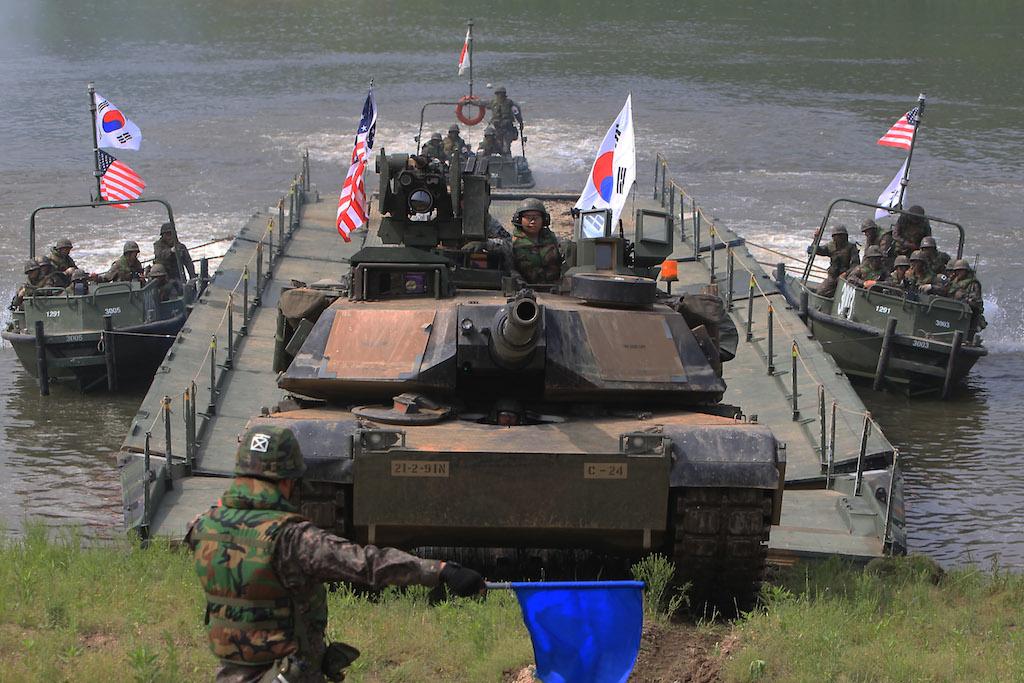Are US war games in South Korea worth the trouble?
US and South Korean soldiers participate in a river crossing exercise on May 30, 2013 in South Korea. Are the exercises worth the trouble?
SEOUL, South Korea — War is all about vicious cycles.
Consider drone strikes. They target alleged bad guys, but they also inspire others to take up arms, and help extremists recruit. The remedy exacerbates the problem.
Likewise, every year the United States teams up with South Korea for war games.
The exercises have been held in various forms since the 1950s. The goal is to deter North Korea, test out invasion scenarios, and help ensure victory if a shooting war ever breaks out. The current annual pairing of two related exercises, called Key Resolve and Foal Eagle, commenced in 2008.
Key Resolve, which concluded on March 6, is a command staff training and largely a computer simulation. Foal Eagle, which runs until April plays out in the real world. The live-fire action features land, sea, air and amphibious operations. This year, 5,200 American servicemen partook in Key Resolve, while 7,500 are now participating in Foal Eagle.
But these exercises provoke tension. China gets irritated. And North Korea often throws a hissy fit. This year, the North has already launched 11 short range missiles since the Feb. 24 start of the exercises.
Last year’s games were particularly fraught, in part because they coincided with a perilous series of events. North Korea had tested a long range missile a few months prior to the start of the exercises.
The United Nations replied with a round of sanctions.
The regime responded with a nuclear detonation and months of war bellicose verbiage.
At the height of the exercises, Dictator Kim Jong Un threatened South Korea and the US with death by inferno.
True, it’s unlikely that Foal Eagle will spark a real war any time soon. And this year, the Pentagon is downsizing the brawn; the exercises will not include strategic bombers or aircraft carriers.
But past threats and showmanship have come close to spiraling out of control.
Another downside to the exercises (and the drone strikes): They serve the propaganda interests of rivals, who use them to portray the US as a super-power bully. North Korea has been known to publish photos of simulated US military beach landings, for instance, hoping to frightenits long-suffering population into loyalty.
So, given the risks and drawbacks, are the exercises worth the trouble?
They are, argues Andrei Lankov, author of The Real North Korea and professor at Kookmin University in Seoul. It’s “common sense” that training is a necessity for any military that wants to stay in shape, he said.
Besides the direct benefits of keeping troops prepped for Korean operations, there are other factors at play. Given the peninsula’s rugged and mountainous terrain, the drills in past years have provided a venue for troops to test out tactics for Afghanistan. The games also deter North Korea from launching conventional attacks and ensure that North Korea maintains a “healthy respect” for the allied military posturing in the South, writes Robert Collins, a former Korea expert at the Department of Defense, on the respected web journal 38 North.
In other words, Washington wouldn’t be wise to scrap war games entirely, even if some experts see room for improvement. “There is so much structural tension”in the relationship between North Korea and its enemies, South Korea and the US, that “just about anything can set off a crisis,”says Remco Breuker, a North Korea expert at Leiden University in the Netherlands. “Scrapping the exercises is not going to help, if the underlying tensions are not removed also.”
In contrast, Cato Institute's Ted Galen Carpenter is more cautious. Military exercises are more useful “as diplomatic symbols than they are for honing military skills — unless the parties are seriously consideringusing force in the near future,” wrote Carpenter, senior fellow in defense and foreign policy studies at Cato. As such, “a diplomatic cost-benefit calculation” is key, and the current situation is particularly sensitive. “Military exercises at this time have an unusually high potential to raise tensions not only with North Korea, but with China. Beijing is getting increasingly uneasy and annoyed about US military actions and intentions in China’s immediate neighborhood.”
The good news: This year, tensions are expected to remain relatively subdued.
“Actually, North Korea has been on a charm offensive recently,” says Lankov, pointing to the re-opening of the Kaesong Industrial Zone, a joint area in North Korean territory that was closed last summer on rising tensions. In recent months, North Korean officials have also held rare press conferences and offered interviews to journalists in China and the UK.
Lankov believes that the garrison kingdom has set up the chain of events nicely. “Everybody knew these exercises would happen,” he points out, but now Pyongyang can say it was playing nice while the US and South Korea ratcheted up the situation.
Still, he adds, North Korea probably won’t push things too far this year. The regime seeks the resumption of large-scale aid and loans from the South, which cut off the cash flow to Pyongyang in 2008. “North Korea doesn’t want to be dependent on China for this.”
